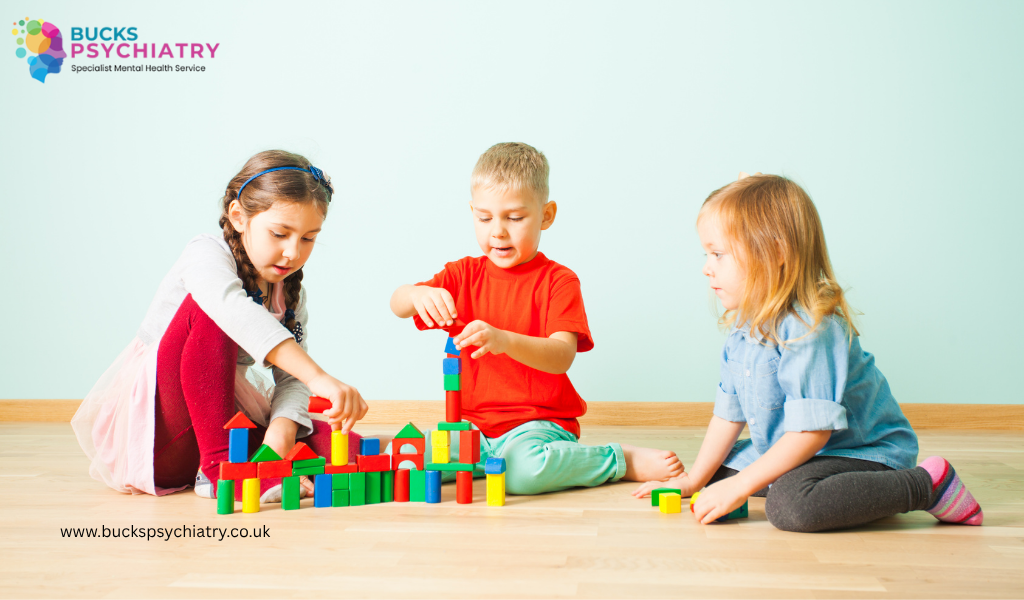Some children struggle with their mental health. This can make it hard to learn, play, or make friends. In the UK, many children do not get help soon enough.
It is important to understand how mental health affects children. This helps parents, carers, and teachers support them in the right way. This issue is not exclusive to children; it can affect anyone.
How Mental Health Affects Young Children?
The first years of a child’s life are very important. Children’s brains grow fast. They learn to control their feelings, focus on tasks, and get along with others.
If a child feels anxious, stressed, or sad a lot, it can affect their learning and behaviour. Children with ADHD, anxiety, or depression may find school or friendships difficult.
Helping children early can make a big difference. Early support can help them feel better its hepl in learn new skills.
Parents and Carers Make a Difference
Parents and carers are very important for a child’s mental health. A child who feels loved and safe at home can handle challenges better.
Sometimes parents may have their own worries or mental health problems. This can make it harder for the child.
Mental health occupational therapy can help. It teaches children skills to manage feelings, focus, and take part in school and home activities. These skills help children feel more confident and happy.
Getting Help Can Be Hard
Even though more people know about mental health now, it can still be hard to get help. Many children wait a long time to see specialists.
Long waiting times can make problems worse. Parents may feel worried and unsure what to do.
A free online ADHD test can help parents see if their child might need extra support. It is not a diagnosis, but it can show if a child needs professional help.
Schools Can Help Too
Schools are important for mental health. They are not just places to learn—they can be safe spaces for children.
Some schools have mental health support teams. They give counselling, advice, and help children learn coping skills.
But not every school has enough support. All children should be able to get help at school when they need it.
How Life at Home Affects Children?
A child’s home life affects their mental health. Children in stressful homes or with money problems may feel anxious or sad more often.
Support should go beyond therapy. Families may need help with housing, money, or community resources. When children get this help and therapy, it can change their lives.
Early Support Is Very Important
The earlier a child gets support, the better. Programs that help parents and children bond, health visits, and early education can prevent bigger problems.
Children who get help early do better at school. They make friends more easily. They feel more confident and happy.
Listening to Children and Families
Children should have a say in their own mental health support. When children feel listened to, they are more likely to engage and use support.
Parents and carers also need guidance. They need to know how to help their child at home.
Working together—children, families, teachers, and health professionals—helps children do better.
Digital Tools Can Help
Online tools can also support children. A free online ADHD test can help parents notice early signs of focus problems.
These tests do not replace doctors, but they are a helpful first step. Some mental health occupational therapy services offer online resources too. Children can use them at home or school to practice coping skills.
What Needs to Change?
Even with progress, many children still do not get help quickly. Waiting lists, few resources, and lack of early support are major problems.
The UK needs more investment in children’s mental health. Early support, school programs, occupational therapy, and preventive care are all important.
Helping children early reduces bigger problems later. It makes school, home, and life better for children.
Conclusion
Children’s mental health affects their life now and in the future. Early support helps children do well at school, make friends, and feel confident.
Occupational therapy, school programs, early support, and online tools like free ADHD tests all help children.
But most importantly, children need adults attention who listen, care, and take action.
Parents, carers, teachers, health professionals, and policymakers must work together. This way, every child in the UK can feel safe, supported, and ready to grow and thrive.


